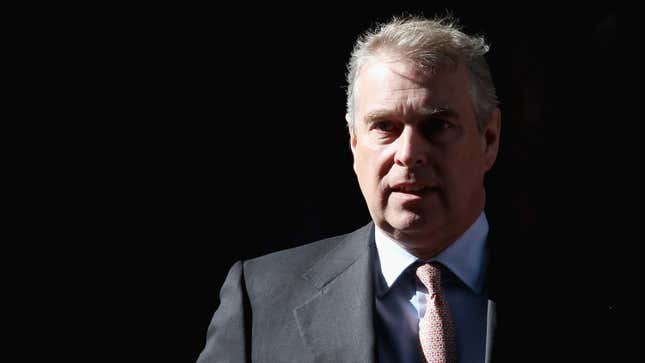

For years, Buckingham Palace has successfully protected Prince Andrew from the consequences of his long-running association with convicted sex offender Jeffrey Epstein. Long before Jeffrey Epstein’s death, his relationship with Prince Andrew was an established fact. They’d been friends for twenty years, a source told Vanity Fair as part of a damning 2011 profile of Andrew and his many embarrassments to the family; “It was Jeffrey who taught Andrew how to relax,” said the source. Epstein is also just one of many disreputable rich men in whose proximity Andrew seems to find himself again and again.
Yet Andrew’s ongoing camaraderie with a known sex offender never quite managed to escalate into an existential problem for Buckingham Palace. Every time the relationship bubbled up, the royals ran a very old play that has worked innumerable times—silence, followed by a terse denial (if absolutely necessary) and then more silence. It didn’t hurt that the Metropolitan Police decided not to pursue a full investigation at the time, Channel 4 revealed. And, of course, the Palace had a lovely new crop of young royals to trot out regularly, generating good headlines for the family and pushing Andrew further into the background. There has been no reckoning.
There has been no reckoning.
But MeToo has changed the cultural context for these scandals, and recent days have brought renewed stream of stories in the British and American press about Andrew’s connections to Epstein. Some with new and hard-to-refute proof: The Daily Mail released a video of Andrew peeking out the door of Epstein’s mansion, reportedly in 2010, looking both sketchy and buffoonish. Buckingham Palace has had to issue increasingly stringent denials, first saying that “any suggestion of impropriety with underage minors [by the Duke] is categorically untrue,” and then later issuing another statement, insisting that: “The Duke of York has been appalled by the recent reports of Jeffrey Epstein’s alleged crimes. His Royal Highness deplores the exploitation of any human being and the suggestion he would condone, participate in or encourage any such behaviour is abhorrent,” via the Guardian.
It’s fairly rich, this idea that Andrew is now appalled, considering that this information has presumably been available to anybody who cared to see it for more than a decade. But the Duke’s long-running failure to own up for his actions, even a decade after Epstein’s initial sentence, presents a question: What exactly does it take for a royal to face consequences?
Britain’s monarchy has always had a complicated relationship with dissipation. The sheer asymmetry of their existence invites excess: larger-than-life partying at best, abuse of power at worst. At the same time, the king or queen (and their many relatives and hangers-on) have always been subject to public scrutiny of their morality (or lack thereof). Whether a royal’s actions prompt fallout or controversy, written off as the prerogative of rank, is often a matter of the wider context of the era.
-

-

-

-

-

-

-

-

-

-

-

-

-

-

-

-

-

-

-

-

-

-

-

-

-

-

-

-

-

-

-

-

-

-

-

-

-

-

-

-








































